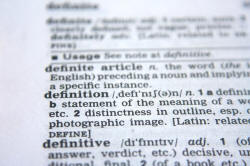Modality and modal auxiliary verbs: the essentials
What follows refers only to English. Languages deal with the modality in a bewildering variety of ways.
 |
What is modality?Modality differs from tense and aspect in that it does not refer
directly to any characteristic of the event, but simply to the status of
the proposition. In other words, modality concerns how the speaker / writer perceives a state of affairs. |
 |
Confusing modal verb terminologyTerminology in this area can get a bit confusing because authorities differ about the names we give to things. Here's a short glossary: |
- modality
refers generally to the way speakers express their view of an event in terms of possibility, ability, probability, likelihood, certainty, permission or prohibition. For example, I can say:
Permission / Prohibition
He must not do that
He is not allowed to do that
He is not supposed to do that
That is forbidden him
I forbade him to do that
Possibility / Ability
He might do that
He isn't able to do that
Probability / Likelihood
He will do that
I expect she'll be late
Certainty
That must be the right answer
That's definitely wrong
and these are all examples of modality in one form or another expressing the speaker's view of the status of the event. - modal auxiliary verbs are often called modal
auxiliaries (or even plain modals) and come in three flavours:
- pure modal auxiliary verbs are:
could, might, may, should, would, must, can, will/shall, had better, ought to
but even here you will find verbs included in or excluded from this list. Some will call these central modal verbs. - semi-modal auxiliary verbs are usually listed as
need, have to, dare, used to
although some will exclude have to from that list and some will include ought to and be able to in the list. These are sometimes called marginal modal verbs although on this site that term is reserved for the next group. - marginal modal verbs are verbs which
express some form of modality but do not share the structural
characteristics of pure or semi-modal verbs and there are lots
of them including, e.g.:
be supposed to, seem to, be likely to, be about to, tend to etc.
- pure modal auxiliary verbs are:
- modal adverbials and adjectives are often
included in the list because they, too, express similar
concepts. This area includes, for example
it is important that
it is vital that
it is unlikely that
it is necessary that
necessarily
importantly
vitally
crucially
and a host more. They are all ways of signalling the speaker's view of an event but do not use special verbs to do it. - modal nouns are also sometimes included in
the list. These are nouns often formed from modal
adjectives and include, for example:
There is a possibility that it will rain
I am making the assumption that he's coming
There's a strong probability that it will rain
and so on.
 |
It might be a unicornAs you can see from the above, modality needn't
be expressed using modal verbs. We can say, for example |
See if you can match modal to function in this little test.
 |
Function |
It's not always as simple as it seems. English uses modal verbs in a complicated way and the area causes endless problems for learners (and teachers). For example, what do these sentences imply about the perceptions of the speaker? Click here when you know.
- He may choose a book.
- He can open the door.
- He should be in London.
Sentence 1 means either
He
is allowed to choose a book
or
It is possible he will
choose a book.
Without a context, it simply isn't
possible to know which because the verb expresses
obligation or permission as well as possibility.
Sentence 2 means either:
He is able
to open the door
or
He is allowed to open the door.
Again, with no context, we do not know what is meant because the
verb expresses both ability and permission.
Sentence 3 means either
He is supposed to be in
London
or
He is likely to be in London.
And here the verb expresses either obligation or possibility /
likelihood.
So, issue number 1 for teachers of English is always to provide a clear context for modal verbs. If you don't do this, you will do more harm than good by confusing your learners.
 |
Form |
Here's a list of some modal verbs in English. What's
different about the semi-modal verbs?
Think about:
- How we make a negative with all of these verbs.
- How we make a question with all of these verbs.
- Whether we put an -s ending on the third person singular of the verbs.
| Pure modal verbs |
| can | could | may | might | shall | should | will |would | must | ought to |
| Semi-modal verbs |
| used to | need | dare |
Click here when you've done that.
For all pure modal verbs:
- Negatives:
- we make negative by putting not
after the verb so we get
He can go → He can't (cannot) go
not:
*He doesn't can go. - Questions:
- we make a question by simply reversing the order of verb and
subject so we get
We can come → Can we come?
not
*Do we can come? - -s
- We do not put an -s on the third person singular form:
He must
not
*He musts
For semi-modal verbs
Here, the situation is more complicated because they sometimes act as 'normal', lexical verbs:
- Negatives:
- we can make a negative by putting not
after the verb
He needn't go
He use(d)n't to go
He daren't go
we can also treat them as normal verbs
He didn't need to go
He didn't use(d) to go
He didn't dare go - Questions:
- we can make a question by simply reversing the order of verb
and subject
Need he come?
Used he to come?
Dare he come?
we can also treat them normally
Did he need to come?
Did he use(d) to go?
Did he dare go? - -s
- we sometimes put an -s on the third person singular form
of dare and need
He dares to go
He needs the money)
but never on used to.
Co-occurrence
Whether the verbs are pure or semi-modal in nature they cannot
co-occur. For example, we cannot have:
*He can must go
*She had better should be here
*He dares need to ask
etc.
However, we do allow a pure modal to be followed by a semi-modal so,
for example:
He may have to talk to her
I should be able to get there
are both possible.
The reverse is not the case so:
*He has to may talk to her
*Is is able to should be here
are not allowed.
You will be delighted to learn that the complications of semi- or marginal modal verbs is not our subject here but you should think for a moment about how the meaning changes depending on the grammar we use. There is a guide linked in the list at the end to semi-modal verbs which includes consideration of some marginal modal verbs.
Pure modal auxiliary verbs are often referred to a central modal auxiliary verbs. That makes some sense but means the same.
 |
Some common modal verbs explained |
This is a short and partial overview of the functions of some of
the common modal verbs.
For more, see the guide to modal auxiliary verbs one by one linked in the
list at the end.
can / could
This verb can express:
- Ability:
He can read Italian but can't speak it well
He could play the piano well as a child - Permission (present and future):
Can I come in?
No, you can't yet
Could I talk to you tomorrow? - (Im)possibility:
Nobody can be sure
The train could be late
may / might
This verb can express:
- Permission:
You may ask a question now
May I smoke here? (More rarely and more formally: Might I speak to you?) - Possibility (present and future):
We may arrive a little late
He might come early
shall / should
Shall is arguably going out of fashion to express the future and there's a strong case to be made for not teaching it for that function, especially at lower levels. However, there are other uses of shall which are still not always replaceable with will. Only the third (and, possibly, the fourth) in this list are common these days and then only in British English.
- In questions:
Shall I do my homework now? - Insistence:
You shall do what I tell you - Intention:
I shan't keep you long - Suggestions:
Shall we go?
Should is much more common and can express:
- Obligation:
You should write to your mother more often - Logical deduction:
He should be there by now - Advice:
You should take something for that cough
What's the negative of the second example? Right, it's
something like
He won't be there yet
or
He can't be there yet.
will / would
- Willingness:
I'll get the milk
Will you have another?
(The verb would can also express this sense in
Would you like another?
but can't be used to express personally willingness except in something like
I'd like another
or
I would be happy to help.) - Intentions and promises:
I'll send you an email soon
We won't keep you
He told me he would write soon
I thought he'd be quick - Prediction (often based on past experience):
It'll probably rain soon; it often does in November
He knew it would rain
He believed I would come - Insistence (present and past):
He will keep arguing with me
He would keep changing the subject - Probability:
That will be him at the door now, That would be typical of him - Characteristic behaviour / habit:
We would often get up really early
When I was younger, I would ... (Compare used to for this function)
must
- Obligation:
You mustn't speak to me like that
You must be home at 6 - Logical necessity / deduction:
That must be his father; they are so alike
There must be an error in the data
Negating these meanings is tricky. What's the negative of the following? When you have a brief note of the answers, click for comments.
- You must take the medicine every day.
- The figure must be correct.
Sentence a. can be negated 4 ways with two different meanings:
You mustn't take the medicine every day
(i.e., you are obliged not to)
You needn't / don't have to / are not obliged to take the medicine
every day (i.e., there is a lack of any obligation)
Sentence b. can be negated two ways:
The figure mustn't be correct (i.e., you
are obliged to give the wrong answer)
The figure can't be correct (i.e., the logical deduction is
that it's wrong)
ought to
- Obligation (weaker than must):
She ought to ask if she doesn't know. - Logical deduction / expectation:
The bus ought to be here by now.
The question and negative forms of ought, for example:
Ought I to come? (= Would it be best if I came)
She oughtn't to speak to me like that (= It is her duty to be
more polite)
are somewhat rare and considered formal.
The forms are, however, parallel to all other pure modal verbs and hence, the
verb is considered here.
 |
Time and tense |
Only some modal verbs have obvious past-tense forms. Here's a list.
| Present | Past |
| can | could |
| may | could / might |
| shall | should |
| will | would |
| must | (had to) |
| ---- | used to |
| ought to | ---- |
| need | ---- |
| dare | dared |
There are two past forms of may: one for possibility, one for
permission. We can say
I could ask questions
and
I
might ask questions
The first means
I was able to ask
questions
OR
It is possible I'll ask questions
The second
only means
It is possible that I will ask
questions
and cannot be used for ability.
The past of must is often had to but not in all
its meanings.
When we are referring to obligations, the past (and the future) are
formed with have to as in, for example:
I had to leave early
I will have to leave early
etc.
When we are referring to logical deduction, we use the perfect form of
the verb to make a past tense as in, for example:
That must have been his sister
When we make a future tense, we use have to:
The train will have to arrive soon
 |
Aspect |
Usually, when a modal verb's function is to express ability or permission,
we can't use progressive or perfect aspects. For other functions
we can use these aspects.
(If any of the above confuses you, try doing
the guide to tense and aspect linked in the list at the end when you
finish and then coming back to review this page.)
For example:
Possibility
They may have got lost
They may have been driving too long
They can't / couldn't have got lost
They can't have been driving so long
Deduction
I must have left my keys on the table
She must have been working on a solution
You must be joking
Prediction
They will have driven that way
John will still be driving at midnight
This part of the page is available as a PDF document. There is also a reference grid of the common modal verbs.
Here's a pictorial (and incomplete) summary of the pure modal verbs. Your task is to look through it and make sure you can devise an example of all the functions.

Click here to do a short test.
| Related guides | |
| grid of the common modal verbs | for reference |
| PDF document | a short PDF document covering some of the above |
| tense and aspect | for some more information and the distinction |
| modality | for the in-service guides to modality and modal verbs |
| modal auxiliary verbs one by one | for a traditional guide to pure (or central) modal auxiliary verbs |
| semi-modal verbs | the guide to semi- and marginal modal verbs |
Reference:
Palmer, F. R, 2001, Mood and Modality, 2nd
ed., Cambridge: Cambridge University Press
